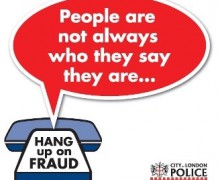This week marks the launch of National Neighbourhood & Home Watch Week 2015, and Neighbourhood Watch coordinators across England and Wales are being urged to take a moment to talk with neighbours about the rising danger of phone scams.
South Wales Police is supporting the launch of National Neighbourhood & Home Watch Week 2015, and Neighbourhood Watch coordinators across England and Wales are being urged to take a moment to talk with neighbours about the rising danger of phone scams.
People being deceived into transferring money directly to fraudsters is now the most common phone scam and new research shows that £23.6m was lost in this way over the course of the year. Neighbourhood Watch is working in partnership nationally with Financial Fraud Action UK to advise members of the public how to avoid falling victim to these scams.
Neighbourhood Watch members and coordinators will be asking their neighbours to pass on advice to three of their friends so that over 2 million people can be reached by the end of the campaign.
This is the first time that Neighbourhood Watch has conducted a campaign on phone scams, and it reflects the changing tactics of criminals who now prefer to minimise the risk of arrest by never coming into direct contact with their victim.
Advice on how to avoid this type of scam
Be wary of:
- Unsolicited approaches by phone.
- Cold callers who suggest you hang up the phone and call them back. Fraudsters can keep your phone line open by not putting down the receiver at their end.
Your bank or the police will never:
- Phone you to ask for your 4 digit card PIN or your online banking password, even by tapping them into the telephone keypad.
- Ask you to withdraw money to hand over to them for safe-keeping.
- Ask you to transfer money to a new account for fraud reasons, even if they say it is in your name.
- Send someone to your home to collect your cash, PIN, payment card or cheque book if you are a victim of fraud.
- Ask you to purchase goods using your card and then hand them over for safe-keeping.
Never disclose your:
- Four digit card PIN to anyone, including the bank or police.
- Your password or online banking codes.
- Personal details unless you are sure who you are talking to.
Remember:
- It takes two people to terminate a call.
- If you feel something is suspicious or feel vulnerable, hang up, wait five minutes to clear the line, or where possible use a different phone line, then call your bank or card issuer on their advertised number to report the fraud.
- If you don’t have another telephone to use, call someone you know first to make sure the telephone line is free.
- Your bank will also never ask you to check the number showing on your telephone display matches their registered telephone number. The display cannot be trusted, as the number showing can be altered by the caller.
- Criminals may already have basic information about you in their possession (e.g. name, address, account details), so do not assume a caller is genuine because they have these details or because they claim to represent a legitimate organisation.
- If you have fallen victim to fraud, or even if you’re unsure, contact your bank immediately and tell them what has happened. You should also report the crime to the police through Action Fraud by calling 0300 123 2040.
Help keep news FREE for our readers
Supporting your local community newspaper/online news outlet is crucial now more than ever. If you believe in independent journalism, then consider making a valuable contribution by making a one-time or monthly donation. We operate in rural areas where providing unbiased news can be challenging. Read More About Supporting The West Wales Chronicle






















